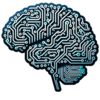
| Part of a series on |
| Artificial intelligence |
|---|
Artificial intelligence in healthcare is the application of artificial intelligence (AI) to copy or exceed human cognition in the analysis, presentation, and understanding of complex medical and healthcare data. It can augment and exceed human capabilities by providing better ways to diagnose, treat, or prevent disease.[1][2] Using AI in healthcare has the potential to improve predicting, diagnosing, and treating diseases.[3] Through machine learning algorithms and deep learning, AI can analyze large sets of clinical data and electronic health records, and can help to diagnose diseases more quickly and accurately.[3] In addition, AI is becoming more relevant in bringing culturally competent healthcare practices to the industry.[4]
AI programs are applied to practices such as diagnostics,[5] treatment protocol development,[6] drug development,[7] personalized medicine,[8] and patient monitoring and care.[9]
Because radiographs are the most common imaging tests conducted in radiology departments, the potential for AI to help with triage and interpretation of radiographs is particularly noteworthy.[10]
As widespread use of AI in healthcare is relatively new, research is ongoing into its application in various subdisciplines of medicine and related industries.
Using AI also presents unprecedented ethical concerns related to issues such as data privacy, automation of jobs, and amplifying already existing biases.[11] Furthermore, new technologies brought about by AI in healthcare are often resisted by healthcare leaders, leading to slow and erratic adoption.[12]
- ^ "Developing an aging clock using deep learning on retinal images". ai.googleblog.com. 2023-04-11. Retrieved 2023-06-01.
- ^ Mullainathan S, Obermeyer Z (May 2022). "Solving medicine's data bottleneck: Nightingale Open Science". Nature Medicine. 28 (5): 897–899. doi:10.1038/s41591-022-01804-4. PMID 35534570. S2CID 248668494.
- ^ a b Jimma BL (2023-01-16). "Artificial intelligence in healthcare: A bibliometric analysis". Telematics and Informatics Reports. 9: 100041. doi:10.1016/j.teler.2023.100041.
- ^ Papadopoulos C, Castro N, Nigath A, Davidson R, Faulkes N, Menicatti R, et al. (2022-01-01). "The CARESSES Randomised Controlled Trial: Exploring the Health-Related Impact of Culturally Competent Artificial Intelligence Embedded Into Socially Assistive Robots and Tested in Older Adult Care Homes". International Journal of Social Robotics. 14 (1): 245–256. doi:10.1007/s12369-021-00781-x. PMC 8062829. PMID 33907589.
- ^ Lyakhova UA, Lyakhov PA (August 2024). "Systematic review of approaches to detection and classification of skin cancer using artificial intelligence: Development and prospects". Computers in Biology and Medicine. 178: 108742. doi:10.1016/j.compbiomed.2024.108742. PMID 38875908.
- ^ Sankar H, Alagarsamy R, Lal B, Rana SS, Roychoudhury A, Agrawal A, et al. (2024). "Role of artificial intelligence in treatment planning and outcome prediction of jaw corrective surgeries by using 3-D imaging- A systematic review". Oral Surgery, Oral Medicine, Oral Pathology and Oral Radiology. doi:10.1016/j.oooo.2024.09.010.
- ^ Qiu Y, Cheng F (April 2024). "Artificial intelligence for drug discovery and development in Alzheimer's disease". Current Opinion in Structural Biology. 85: 102776. doi:10.1016/j.sbi.2024.102776. PMID 38335558.
- ^ Ghanem M, Ghaith AK, Bydon M (2024). "Artificial intelligence and personalized medicine: transforming patient care". The New Era of Precision Medicine. Elsevier. pp. 131–142. doi:10.1016/b978-0-443-13963-5.00012-1. ISBN 978-0-443-13963-5. Retrieved 2024-10-10.
- ^ Snider V, Homsi K, Kusnoto B, Atsawasuwan P, Viana G, Allareddy V, et al. (May 2024). "Clinical evaluation of Artificial Intelligence Driven Remote Monitoring technology for assessment of patient oral hygiene during orthodontic treatment". American Journal of Orthodontics and Dentofacial Orthopedics. 165 (5): 586–592. doi:10.1016/j.ajodo.2023.12.008. PMID 38363256.
- ^ Adams SJ, Henderson RD, Yi X, Babyn P (February 2021). "Artificial Intelligence Solutions for Analysis of X-ray Images". Canadian Association of Radiologists Journal. 72 (1): 60–72. doi:10.1177/0846537120941671. PMID 32757950. S2CID 221036912.
- ^ Floridi L, Luetge C, Pagallo U, Schafer B, Valcke P, Vayena E, et al. (2019-09-01). "Key Ethical Challenges in the European Medical Information Framework". Minds and Machines. 29 (3): 355–371. doi:10.1007/s11023-018-9467-4. hdl:2318/1728336. ISSN 1572-8641. S2CID 49668711.
- ^ Petersson L, Larsson I, Nygren JM, Nilsen P, Neher M, Reed JE, et al. (July 2022). "Challenges to implementing artificial intelligence in healthcare: a qualitative interview study with healthcare leaders in Sweden". BMC Health Services Research. 22 (1): 850. doi:10.1186/s12913-022-08215-8. PMC 9250210. PMID 35778736.
